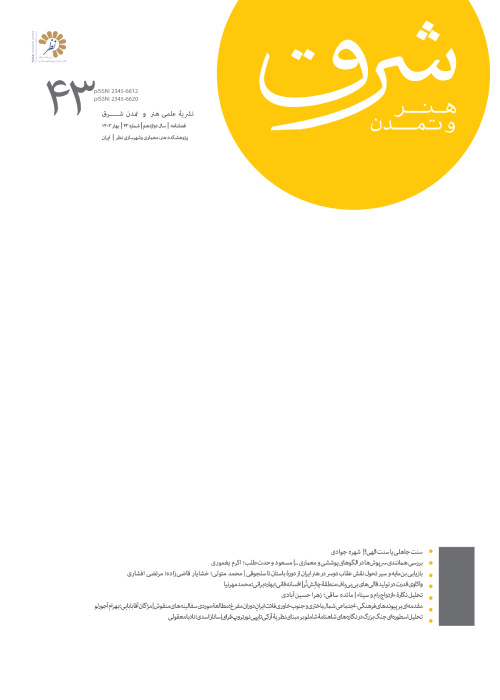Reviewing the Historical Narrative of " Water and Tree" in the Islamic Era of Iran
Author(s):
Abstract:
Natural phenomena such as the sun, the moon, stars, water, plants, fire, mountains, animals, the earth and the sky bear special value among different tribes. Mankind has sanctified these phenomena, has created signs and symbols for them and has attributed them to certain deities. Ancient Iranians cherished water and plants and considered them the signs of Mehr and Anahita. Religious rituals related to water and trees and the deities to whom they were attributed had their roots in Irans prehistoric culture, and continued to exist with new content in the Islamic era in such a way that worshipping Anahita has changed into shefaat (intercession) and tawassul (supplicating to God through a prophet or saint, dead or alive).
Anahita, the goddess of water, is characterized as a lady with natural features and a developed personality and is the symbol of the fertility of mankind, animals and plants. This belief has been so strong in the Persian culture that it still continued to exist after the advent of Islam into Iran. The rain ritual and recourse to Hazrat Fatehem Zahra (SA), the daughter of Prophet Muhammad (PBUH), and Hazrat Abbas (SA), the brother of Imam Hussein (SA), replaced water rituals and recourse to Anahita. Although the form of the ritual has been preserved during the metamorphosis, the content has changed from recourse to Anahita for bringing rain to recourse to Islamic divine individuals for intercession with God. Intercession with God, of course, relies on Gods permission. Water and plants are not sacred in Islamic beliefs. Nevertheless, they are revered as cherished elements of nature in Quran due to their important role in mankind's life and their relations to ancient beliefs. A great change which took place about these rituals is the reference of the ritual. While Anahita was the reference of prayers in ancient Iran, now Islamic divine individuals are resorted to as intermediaries and intercessors, and the intercession itself depends on Gods permission.
Anahita, the goddess of water, is characterized as a lady with natural features and a developed personality and is the symbol of the fertility of mankind, animals and plants. This belief has been so strong in the Persian culture that it still continued to exist after the advent of Islam into Iran. The rain ritual and recourse to Hazrat Fatehem Zahra (SA), the daughter of Prophet Muhammad (PBUH), and Hazrat Abbas (SA), the brother of Imam Hussein (SA), replaced water rituals and recourse to Anahita. Although the form of the ritual has been preserved during the metamorphosis, the content has changed from recourse to Anahita for bringing rain to recourse to Islamic divine individuals for intercession with God. Intercession with God, of course, relies on Gods permission. Water and plants are not sacred in Islamic beliefs. Nevertheless, they are revered as cherished elements of nature in Quran due to their important role in mankind's life and their relations to ancient beliefs. A great change which took place about these rituals is the reference of the ritual. While Anahita was the reference of prayers in ancient Iran, now Islamic divine individuals are resorted to as intermediaries and intercessors, and the intercession itself depends on Gods permission.
Keywords:
Water , tree , Anahita , Ritual worship , shrine , Islamic era
Language:
Persian
Published:
Journal of Art and Civilization of the Orient, Volume:1 Issue: 1, 2013
Pages:
3 to 8
magiran.com/p1528962
دانلود و مطالعه متن این مقاله با یکی از روشهای زیر امکان پذیر است:
اشتراک شخصی
با عضویت و پرداخت آنلاین حق اشتراک یکساله به مبلغ 1,390,000ريال میتوانید 70 عنوان مطلب دانلود کنید!
اشتراک سازمانی
به کتابخانه دانشگاه یا محل کار خود پیشنهاد کنید تا اشتراک سازمانی این پایگاه را برای دسترسی نامحدود همه کاربران به متن مطالب تهیه نمایند!
توجه!
- حق عضویت دریافتی صرف حمایت از نشریات عضو و نگهداری، تکمیل و توسعه مگیران میشود.
- پرداخت حق اشتراک و دانلود مقالات اجازه بازنشر آن در سایر رسانههای چاپی و دیجیتال را به کاربر نمیدهد.
In order to view content subscription is required
Personal subscription
Subscribe magiran.com for 70 € euros via PayPal and download 70 articles during a year.
Organization subscription
Please contact us to subscribe your university or library for unlimited access!


